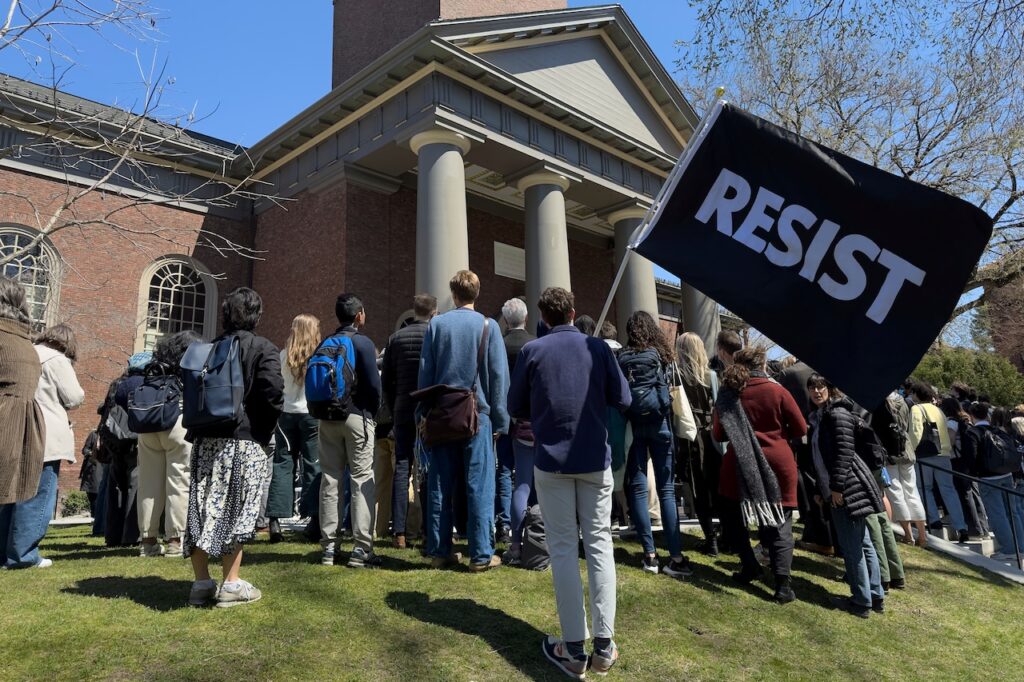For now, Harvard University’s conflict with the federal government centers on some $2.2 billion in federal funding frozen by the Trump administration when the elite school brushed off most of its demands for vast reforms to admissions, discipline and management policies.
But the conflict may turn to another threat to Harvard’s finances, President Donald Trump has signaled.
On social media earlier this month, he wrote that Harvard “perhaps” should lose the tax exemption it enjoys as an educational institution, accusing the school of acting instead as a “political entity.”
Like numerous public and private schools, Harvard’s educational mission allows it to register as a charitable organization and avoid the federal corporate income tax. Museums, religious institutions and other nonprofits enjoy a similar benefit for their service to the public.
Harvard has said there is “no legal basis” for the government to challenge its tax exemption.
Read more: At Harvard, American and international students vow they won’t let Trump divide them
The school’s endowment is reported to be roughly $52 billion, the largest for any university in the country.
The centuries-old pool of investments grew by 5% last year, or nearly $2.5 billion. If Harvard’s taxes on its income spiked, the financial hit would be “enormous,” said Johnny Rex Buckles, an expert on tax law and professor of law at the University of Houston.
House Republicans have also proposed raising the tax rate from 1.4% to 21% on endowment profits at certain universities with especially heavy endowments, including Harvard. Under that proposal, the school could be taxed more than $500 million annually.
But it’s the university’s income tax exemption itself that Trump has specifically zeroed in on and referenced in public comments.
“Tax-exempt status, I mean it’s a privilege and it’s been abused, by a lot more than Harvard,” Trump said in the Oval Office this month, shortly after the Washington Post reported that his administration has asked the Internal Revenue Service to reevaluate the university’s tax exemption.
Tax-exempt charitable organizations like Harvard must serve specific purposes, which, according to the IRS, include “relief of the poor, the distressed, or the underprivileged; advancement of religion; advancement of education or science.”
Harvard is also exempt from state income tax for its educational and research purposes.
Though exempt from property taxes, the university also contributes to the cities of Cambridge and Boston, where it holds significant real estate, through voluntary Payment in Lieu of Taxes, or PILOT, agreements.
Trump’s suggestion that Harvard be taxed as a political organization would place it in the category of political parties, committees for candidates running for public office, and political action committees, which have different tax requirements than charities or traditional corporations.
But much stands in the way of Harvard losing its charitable tax benefits, Buckles cautioned.
It would take more than Trump’s order, he said: an IRS investigation into whether Harvard violated its responsibilities as a tax-exempt charitable entity, certainly an appeal from Harvard if the agency revoked the exemption, and then a likely court battle.
The tax exemption is “particularly valuable” for an institution like Harvard, with a monumentally large endowment that can reportedly grow by billions annually, Buckles said. However large the school’s endowment is, the exemption provides “a real benefit” for Harvard, he said — one that the school will go to great lengths to protect.
The exemption also allows Harvard donors to claim tax deductions for their charitable contributions to the school, encouraging future donations toward research, the arts and other initiatives.
If the Trump administration pursued the issue in earnest, Harvard could take the matter to the federal appellate courts or the Supreme Court.
“I think that is how much [Harvard] cares about this,” Buckles said. And if it goes that far, he thinks Harvard would win.
But in the shorter term, the university’s lawyers are preparing for a summer court date as they seek to protect billions in federal research funding frozen by the government.
Trump administration officials say they’ve targeted Harvard because the university has done too little to protect Jewish students from campus antisemitism.
On Tuesday, Harvard released long-awaited reports on antisemitism and anti-Muslim or anti-Arab bias, finding a collection of failures by the school to adequately support students of Jewish, Muslim, Arab or other backgrounds or manage the heightened campus tensions after the Oct. 7, 2023, attacks on Israel.
The school says it has taken meaningful, ongoing steps to combat discrimination against Jews, while acknowledging on Tuesday significant work ahead to correct hostilities on campus.
The withdrawal of federal funding, which would affect research on everything from cancer to national defense, has no link to curbing antisemitism, Harvard has argued.
Read more: Harvard is a lot more than its university campus. What else could funding cuts affect?
The historical precedent for a university losing its tax exemption is the Supreme Court’s near-unanimous 1983 decision upholding the IRS stripping the tax exemption of Bob Jones University, an evangelical school in South Carolina that banned interracial relationships on campus.
An attempted crackdown on Harvard’s exemption would hinge on proving the school violated a key federal standard for charitable organizations — they must serve the public interest and not violate an “established public policy,” such as preserving students’ civil rights, Buckles said.
“In Bob Jones University, the school itself had an official policy that prohibited interracial dating and interracial marriage,” he said. “It was an official policy. When I think of Harvard having any kind of official policy that’s discriminatory, it’s completely false.”


